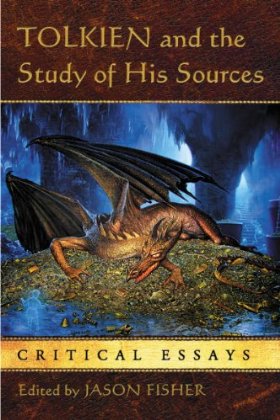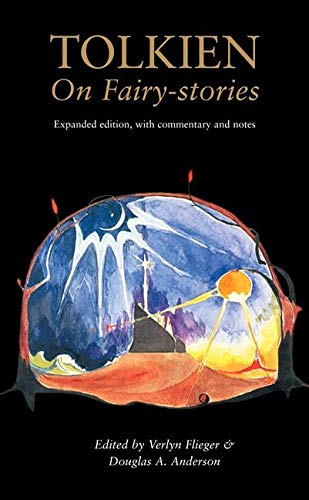Tolkien and the Study of his Sources: An Interview with Jason Fisher
1 Aug, 2011
(edited)
2011-8-1 8:30:13 PM UTC
2011-8-1 8:30:13 PM UTC

An important work in Tolkien Scholarship has just been published, and is even now shipping to eager readers. I don't have my own copy yet, but that hasn't stopped me from reading the book and asking the editor Jason Fisher a few questions about the genesis and growth from idea to book. In my own humble opinion, this is a very strong contender for the Mythopoeic Award for scholarship in 2012 (where I certainly plan on meeting Jason face to face for the first time, which seems amazing as we have been corresponding for years).
Jeremy: In the preface, you mention that source study has emerged as one of the most popular approaches in Tolkien studies, but this is the first collection specifically focused on it. Can you talk a little bit about your personal approach, what gave you the idea to put this collection together, some of the trials and tribulations you went through, and why you think this is such a successful culmination of your efforts?
Jason Fisher: There can be no doubt source criticism is one of the most popular approaches to Tolkien’s work — the proof is in the number of published essays that clearly fall under the umbrella — but for the most part, the work has been confined to journals. Many of these are small, with very limited circulations; consequently, the findings of source scholars have a tendency to disappear. Even when we can see their tantalizing titles or abstracts preserved in Tolkien bibliographies, it can be very difficult to lay hands on some of the essays themselves.
There have been a few books published before now that could loosely be termed source criticism. The most important is Tom Shippey’s The Road to Middle-earth — but this books is much more besides a collection of source studies. There is also Stuart Lee and Elizabeth Solopova’s collection of primary materials known to have influenced Tolkien (The Keys of Middle-earth), along with accompanying essays. Both are essential reading, but neither lays out the methodology behind source criticism (in fact, Lee and Solopova take great pains to deny that their book is really about source criticism at all), and that’s one of the main things I felt was lacking in a single collection on the subject. Moreover, both these books take as their primary focus Tolkien’s medieval influences (though not the exclusive focus in Shippey’s case). I wanted to bring together source studies covering the whole gamut, from biblical mythopoeia all the way up to Tolkien’s own lifetime and just about every period in between. That’s a tall order, I know, but I think I’ve done it.
How did I get the idea? Well, source criticism tends to be my own approach, and from time to time people ask me how I go about it as well as how I justify it, both in the face of Tolkien’s own dismissals and frequent condescension or outright hostility from some corners of the academy today. I have wished there was a collection I could recommend to these younger scholars and devotees, so it gradually dawned on me that I was going to have to assemble it myself. It’s a bit like the bargain between Jack and Tollers: there wasn’t really a single convenient collection of the kind I wanted to read and recommend, so I did it myself. Well, not all by myself, certainly! As you know, I have had the enthusiastic support and encouragement of many fine scholars, of which a dozen or so were moved to contribute to the collection directly. These include Tom Shippey — the man who started it all, in my view — along with John Rateliff, Diana Glyer, Thomas Honegger, Kristine Larsen, and others.
The trials and tribulations mainly involved the glacial pace with which the collection took shape. The first inklings (forgive the unavoidable pun) that I had of assembling something like this came in the wake of Mythcon 39 in Connecticut in 2008, and it took three years to finish the manuscript. This was largely because I had a dozen people’s schedules to take into account. Many of them are teachers, meaning their availability is limited to summers or sabbaticals. The editing was also quite a lengthy process. One of the things that sometimes bothers me about scholarly collections is the often random, disconnected nature of the essays included. None of the contributors seem to be aware of one another, and of course, often they are not — but the editor is. I wanted to ensure that the essays worked well together, that each filled in gaps left by others, that they did not overlap unnecessarily, that the complemented and conversed with one another. A bit like the great chain of reading, if I may make so bold. You will find references among the essays to others in the collection. This harmonizes the various parts of the book as a cogent whole. I also made a point of encouraging contributors to survey the larger body of critical work that has laid the groundwork for their studies, where appropriate, and I have in many places supplemented their surveys with additional references. The book collectively refers to more than 300 other works, both primary and secondary, which I daresay is just a bit more comprehensive than most essay collections on Tolkien.
What were you most surprised by when you were working on putting this book together?
JF: One surprise was just how interested people are in the subject! Scholars always flatter themselves that their field is the most important or interesting, but in this case, there really has been a great deal of interest — both on the part of readers and even on the part of the scholars I approached about contributing. All but one of the essays in the book were written at my personal invitation, and I think it says a lot that these invitations were accepted so eagerly. People seem to have a lot to say about sources and source criticism, and a lot of people want to read about them as well. Again, at the risk of belaboring the point, source criticism has always been one of the most popular approaches to Tolkien, and when it is done well, I think it is also one of the most fruitful.
Some critics have dismissed this approach as "source hunting". What is the difference, if there is any difference at all, between source criticism and source hunting?
JF: To me, this is a false dichotomy. I really see no productive distinction between the terms. In the nineteenth-century jargon of philology and literary criticism, the Germans called source criticism Quellenforschung, and this just means "source-hunting". It's a straightforward idea, because this is exactly what we are doing. Admittedly, the "hunting" can sometimes become overzealous, but all methodologies are prone to various kinds of abuse. Some argue that we shouldn't be actively hunting for sources, but rather simply noticing them, in a more passive sense. This is a legitimate position in the debate, but one I do not hold myself. To me, literary research is not a passive process. Criticism is not something that happens to you, but something you undertake with deliberation. We may all have passive, serendipitous insights from time to time, but even when these occur, they are just the beginning of the process. After that comes the real work! Some critics today — either defenders of source criticism who seek to rename the poorer examples to differentiate them from the good, or enemies of source criticism altogether — may use "source hunting" in a derogatory sense. But again, I think there is no need for such a distinction. It merely serves to rob source criticism of its integrity. There are poor examples in all approaches to literature, but most of these disciplines have not attracted their own denigrating names. You just say an essay is a "bad post-colonial argument" or a "poor application of queer theory" or "New Historicism run amok" or something like that. You don't break out the mock-quotes and deride the discipline with a sarcastic variation on its name. In fact, I'd like to reclaim "source hunting" for source scholars, because this name conveys some of the sense of excitement in the discovery of new or hitherto overlooked sources!
Do you think your book tries to address these dismissals - in other words, do you attempt to respond to opponents of the methodology? Are there any skeptical papers in the collection that specifically try to address questions about the validity of source criticism?
JF: I find that most opponents of source criticism know very little about the methodology; more often, they object on principle and just throw the baby out with the bathwater. Or they cite Tolkien's objections, and again, disqualify the whole discipline. But yes, my book does seek to address these dismissals. In fact, I also tackle Tolkien's own statements against the discipline. Anyone who wishes to undertake source criticism must address these opposing viewpoints. In the case of Tolkien's own statements, these are well articulated and require careful rebuttal. In my book, objections are not simply dismissed, but are taken seriously and actively engaged. This is partly the purpose of the first part of the collection, especially in the essays by Tom Shippey, Ed Risden, and me.
There are no skeptical papers in this collection, unless you count portions of my own essay, pointing out the pitfalls of careless source criticism; but I did put together a panel discussion on source criticism at Mythcon 41 in Dallas last summer which gave equal time to the skeptics. The panelists were myself, John Rateliff, and — representing the more skeptical viewpoint — David Bratman. Merlin DeTardo moderated the panel impartially, and some difficult questions were raised, and the argument for and against source criticism was spirited and rewarding.
Please note that Amazon.com still lists the book as not available until November (as of my writing this) but the book is definitely in print, and Amazon should be able to ship copies as soon as they make it through their warehouse system.







 104
104 12.37K
12.37K